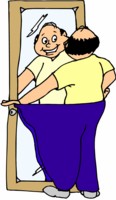|
           
|

|
|
[
home
l trainer index l menu
l superstore
l radio archives
l ask phil l contact
l nutritionals ]
Personal Training
Success
The Four Keys,
and Three Primary Pitfalls
by Phil Kaplan
PART
I – The Four Keys
 Carl
Bedford liked working out. Carl
Bedford liked working out.
Carl
didn't call his shoulders "shoulders." He called his
shoulders "delts." His thighs, in the gym, became
known as his "quads & hams," and his chest was
never referred to as a chest. The entirety of the chest fell
under the heading of "pecs."
Carl
was relatively lean, had a six-pack fighting to come through,
and looked great in a tight polo shirt. That's why, when he
saw the sign, "Personal Trainers Wanted: Will Train
and Certify," he applied for the position. His bartending
job was getting tiresome, he loved being in the gym, and if
he could get paid for hanging around the gym working with his
buddies, why not take advantage of it?
Carl
knew the manager, so the interview process was more of an informal
chat, and handshake, and an appointment was set for Carl to
attend a workshop. 12 prospective trainers attended the 5-hour
workshop. They all knew "delts," "hams &
thighs," and "pecs," but in the workshop they
also learned about the transversus abdominus, the internal obliques,
and the Krebs cycle. They learned about calculating Target Heart
Zone, about fast twitch and slow twitch muscle fibers, and they
were taught how to assess posture and identify imbalances.
The
test was taken from home, online. They were given passwords
to access the 35-question test. Three of the participants opted
not to even bother with the test, but the remaining 9 all passed.
All 9 were hired, all 9 got their new shirts (cost to be deducted
from their first paycheck) and all 9, after an Orientation explaining
"the way things work around here" were sent out on
the floor with clipboards to present members with the free training
session they were entitled to. Four of the nine trainers remained
on staff after the second week. Carl was one of the four, and
by the time week three was complete, Carl had conducted 31 free
30-minute sessions. He managed to land two clients and his confidence
was growing. Unfortunately, he started missing his bartender
tips. His live-in girlfriend started putting the pressure on,
asking when he's going to start seeing something in return for
all of his hard work.
After
the first month only Carl and Dana remained. Dana was struggling,
but she did have a few solid clients. Carl seemed to be busy
all the time. Because he was "a hustler," he would
get the majority of new members. He'd typically be in the gym
8 hours a day, busy almost every minute he was there, but he
started to realize it was hard to get clients. People seemed
to enjoy the free sessions, but when he tried to sell them the
20-pack, or the 60-pack as management instructed him to push
for, they all seemed to want to think about it.
When
Dana resigned, Carl picked up her clients, and in Month 3 he
was generating $400 a week in personal training. $400 didn't
make his girlfriend happy, and as his client base stagnated,
the free sessions and Carl's stress level were on the rise.
This
story is 100% true. I met Carl because he came in for a job
interview. He looked great. He had the like-ability gene. He
probably had much of what it takes to become a successful personal
trainer, but I met him too late. He was cynical, convinced making
money as a trainer is hard, convinced the only way he was going
to succeed was to come work for someone like me and get a big
fat salary. He believed he was entitled to that salary because
he was a great trainer. I never saw Carl again. I assume he's
tending bar, maybe with a new girlfriend in his life, and limiting
his time in the gym to taking care of his delts, quads &
hams, and pecs.
 Carl's
story is all-too-common. If you'd ask him he'd tell you he did
everything right. He attended the workshop, he passed his certification
exam, he conducted hundreds of sessions, his "freebies"
loved him, and he managed to get some clients to pay repeatedly.
I don't blame Carl. In my opinion he was a victim of an immature
industry that hasn't yet developed a clearly defined career
path. I won't attempt to lay out the details of the career path
in a single article, but it's a part of the legacy I hope to
leave. My future seminars and works will be directed in great
part at helping personal trainers understand the keys to success,
and . . . Carl's
story is all-too-common. If you'd ask him he'd tell you he did
everything right. He attended the workshop, he passed his certification
exam, he conducted hundreds of sessions, his "freebies"
loved him, and he managed to get some clients to pay repeatedly.
I don't blame Carl. In my opinion he was a victim of an immature
industry that hasn't yet developed a clearly defined career
path. I won't attempt to lay out the details of the career path
in a single article, but it's a part of the legacy I hope to
leave. My future seminars and works will be directed in great
part at helping personal trainers understand the keys to success,
and . . .
at
helping them recognize and avoid the perilous pitfalls
that prevent people with true potential from ever finding career
success doing something they genuinely love.
In
this article I want to first identify four keys that lead to
operating in the realm of "a Fitness Professional,"
a realm where emotional, physical, and financial reward all
align.
The
First of the Four Keys: Professionals Are Compensated for their
Time
 Lawyers
learn to bill every working minute to a client. Hair stylists
have a full calendar during working hours and they're paid for
every client they service. Golf pros are paid for the lessons
they conduct. Physicians are paid for interacting with patients. Lawyers
learn to bill every working minute to a client. Hair stylists
have a full calendar during working hours and they're paid for
every client they service. Golf pros are paid for the lessons
they conduct. Physicians are paid for interacting with patients.
Trainers
. . . . well . . . . they do free stuff.
I'm
not suggesting we are in the same category as medical professionals,
legal professionals, or any other professionals, but I am suggesting
there is an element of the term "profession" that
carries across career boundaries. Even professional athletes
are paid for the time they spend on the field, even if it's
spent sitting on the sidelines watching 11 guys wearing the
same uniform battle toward the goal line.
More
than anything else, this requires a mindset shift, a recognition
of the true value of the knowledge a competent personal trainer
has amassed, and more importantly, the value of the impact that
knowledge can have on an individual's life. The word "de-serve"
comes from Latin, translated as "of-service." If we
serve our clients by delivering health-inducing outcomes, by
helping them improve their bodies inside and out, by radically
kicking up the quality of their lives, don't we "deserve"
to be justly compensated? The answer is yes.
Let's
not mistake my affirmative and confident response as an indication
that all trainers deserve to be compensated for their time.
Carl certainly was limited in his knowledge, he had little training
in helping people apply situation-specific protocols, and he
had never actually proven any real propensity to deliver desired
results. Carl, while he appears to be a very nice man, is not
a Fitness Professional. If you are not yet a Professional, it's
OK to do things that you'd hope to someday be paid for on a
complimentary basis, as this can serve as a part of your education
and growth. Once, however, you achieve a position where you
can unquestionably utilize your knowledge to help others safely
and effectively achieve the results they seek, you "DESERVE"
to be compensated for your time.
The
Second Key: Professionals Control Their Own Calendars
An
important word trainers forget to use is, "no." Remember
Dana? She was the trainer who didn't make it as long as Carl.
In telling me his story, Carl complained about inheriting Dana's
clients, because they were scheduled erratically. "She
had a 6 A.M. client, then she didn't have another until 9, and
then she had a 7 P.M. client."
Trainers
often blame their crazy schedules for fatigue and burnout. They
have to be taught that their time is every bit as important
as their clients' time. I encourage fitness professionals to
determine the specific hours they "want" to work.
I'm not even suggesting they choose the hours they're "willing"
to work. I've learned it's not only possible, but extremely
gratifying, to prepare you calendar before you take on a single
client. Decide what times you're going to conduct training sessions,
and if a prospective client tells you he or she can ONLY train
at a time outside of your selected hours, stop and take a moment
to realize that taking that client means extreme and unnecessary
sacrifice on your part. To accommodate your client's calendar,
you are willing to screw up your own.
You
own your time, and you are free to decide when you're going
to have "me" time, family time, workout time, planning
time, downtime, recreational time, and play time. All of that
time is important, and don't allow others to stomp on your enjoyment
of your career and your life. One of two interesting things
often happen when a prospective client says, "I can ONLY
train Monday nights," and you respond with, "I wish
I could accommodate you, but Monday night is my date night with
my wife." The first common scenario plays out with something
to the effect of, "well . . . I guess I could come in before
work, I just didn't feel like getting up that early. OK, how
about I take that Monday morning at 7:30 slot." The second
common occurrence that will at first surprise you is, when you
turn away a client, another shows up in his or her place, ready
to fit into your schedule. I don't know why, call it the odd
laws of the Universe, but when you take control of your calendar,
you'll be amazed how things just seem to fall into place.
The
Third Key: Professionals Strive to Deliver More Value Than People
Expect
When
I conduct seminars for personal trainers I always share this
important key. If you are going to thrill people, it's important
to go beyond "customer satisfaction" and deliver MORE
than they expect. I then ask a question. "Is this difficult."
Immediately heads nod, eyes roll, and "yes" is uttered
in a mumbling unison. That's when I point out an experience
that every professional personal trainer has had more than once.
A client comes to you with a specific goal in mind, perhaps
a 20-pound weight loss. Sometimes the client has a goal date,
perhaps a reunion, a wedding, or an important event. The day
comes when the follow-up assessment takes place and the client
has achieved the goal. He or she smiles, and always expresses
that this is unbelievable.
"Wow!
I feel great. I've lost 20 pounds and I'm fitting into clothes
I never thought I'd wear again! This is unbelievable!"
 It's
time to stop and recognize the subtlety of that statement. Why
is it unbelievable? All you, as the personal trainer, did was
provide what they asked you for. The fact that people find "the
desired result" unbelievable illustrates that while they
often hope for a result, they rarely expect it. Their expectations
are low. Criminally low. I hope, over the course of the next
few years, as more fitness professionals emerge with greater
competence and greater confidence, clients will come to expect
results. Right now, if you simply do what you promise, you'll
thrill each and every client! It's
time to stop and recognize the subtlety of that statement. Why
is it unbelievable? All you, as the personal trainer, did was
provide what they asked you for. The fact that people find "the
desired result" unbelievable illustrates that while they
often hope for a result, they rarely expect it. Their expectations
are low. Criminally low. I hope, over the course of the next
few years, as more fitness professionals emerge with greater
competence and greater confidence, clients will come to expect
results. Right now, if you simply do what you promise, you'll
thrill each and every client!
The
Fourth Key: Professionals Take Responsibility for Influence
The
word responsibility is an important one for anyone earning a
living by acting in the role of advisor, coach, or educator,
and a fitness professional plays all three of those roles. Responsibility
can be defined as "the ability to respond." Entrepreneurs
share a commonality. If they fail to earn, they fail to eat.
A fitness professional in the great majority of cases, must
have some of the qualities of an entrepreneur. Sure, there are
the corporate jobs where fitness professionals are salaried,
and there are opportunities for fitness professionals to work
in a medical or rehab environment punching a clock for pay,
but for most who seek the highest levels of success as personal
trainers, there is an undeniable need to cultivate, motivate,
and thrill clients, and the most important trait necessary to
handle those vital tasks is the ability to effectively influence.
It's
easy to blame a health club's operating policies, a client's
habitual tardiness, or the fast food companies for a failure
to attract or keep clients. As professionals, we don't understand
easy. We understand that our clients will run into obstacles.
We understand that people harbor self-doubt and false beliefs.
We also understand there are many entities all seeking the attention
of our clients and prospective clients. That's where response-ability
comes in. Professionals don't accept things as they are, but
recognize that they have the ability to identify challenges
and obstacles and respond. The responses that you bring to situations
and client challenges are the forces that propel both your clients
and your career forward. Taking people through workouts isn't
enough. We have to identify obstacles and use well-honed influence
skills to break through.
It
would be a wonderful thing if isolating the four keys were enough.
It would also be a wonderful thing if I found a planet inhabited
by beautiful women who brewed fat burning beer. Since I haven't
yet found that elusive planet, it's safe to assume there are
issues beyond the four keys. I'll address three of those issues
as the Three Pitfalls that can snuff out a personal training
career faster than my two-year-old daughter blows out birthday
candles, and that's fast. Really fast.
Part
II - The Three Pitfalls
The
First Pitfall: The Bar's Too Low, the Paradigm's Broken
Carl's
entry into the field should be viewed as an absurdity, but it's
so common it's almost the overwhelmingly popular entry process.
Sit for a one-day workshop that teaches you how to pass a test,
learn a few odds and ends about anatomy and the human body,
and you're granted a certificate that supposedly "qualifies"
you to affect the health and well being of others. Here's a
secret. Ashley Kaplan is a certified personal trainer. Here's
another secret. Ashley Kaplan is a cat. Seriously. I wanted
to prove that anyone can get a certification. I sat with the
cat, took an exam online for $69, and Ashley received a beautiful
certificate proclaiming her validation as a certified personal
fitness trainer.
 There's
a story told of the five monkeys experiment. There's
a story told of the five monkeys experiment.
Five
monkeys were put in a large cage. In the middle of the cage
was a ladder and bananas hung just above the ladder. Every time
one of the monkeys climbed the ladder and tried to grab a tasty
treat, the experimenting scientists sprayed all of the monkeys
with water. After awhile, any time one of the monkeys headed
toward the ladder, the other four physically stopped the approach.
After awhile they would violently beat any monkey who ventured
toward the bananas. The scientists then removed one monkey and
replaced it with another monkey, one who had never been exposed
to the hosing. From that point forward they put away the hose,
never spraying the bothersome water. Of course the newcomer
headed toward the ladder and the other monkeys pounced and beat
it violently. After a few days, the new monkey, even though
it had never been sprayed, joined in the beating when another
monkey summoned up some bravery. A second monkey was replaced
and within days there were again five monkeys who would beat
each other violently. Eventually all five of the original monkeys
were replaced and the beatings continued. None of the monkeys
had any reason for doing what they were doing, they simply followed
what appeared to be convention.
I
know, I know, but they're monkeys. We're talking about fitness
professionals. We're talking about people with intelligence,
people with independent thought abilities, people who are free
to make their own decisions. Let me change the story.
 In
a health club there are five trainers and a dictatorial club
owner. In
a health club there are five trainers and a dictatorial club
owner.
The
club owner has a rabid temper and insists that every new member
get three free workouts with a trainer. If any trainer fails
to contact a designated new member, the owner would scream,
spit, yell, and create a spectacle ridiculing the trainer. Eventually,
the trainers all started doing free sessions. The owner didn't
arrange for the trainers to be trained in the art and science
of human influence, yet he decided he would only pay the trainers
a bit beyond minimum wage if they convinced the members to pay
them for the training services they were told to offer for free.
The trainers believed they were worth $50 per hour, but when
they failed to generate business, the owner screamed, spit,
yelled, and all but exploded and insisted they sell packages
discounting their rates if members were willing to commit. "Sell
20 sessions for $300!" the owner roared, so the trainers
started discounting their rates to sell packages. Eventually
the owner sold the club, and the training team continued to
offer free sessions and discounted package rates. A new trainer
was hired. He thought he was worth $50 per session. He didn't
understand, at first, why trainers trained new members for free,
nor did he understand why he would be asked to sell 20-session
packages for what equated to $15 per session. The existing trainers
explained to the best of their ability. "Because that's
the way things have always been around here." Eventually
the new trainer conducted free sessions and sold discounted
packages. One year later, the original five trainers had all
moved into other careers, but there were five new trainers offering
free sessions and discounted packages.
'Nuff
said.
Don't
follow convention unless you want to be like everyone else.
The only reason the majority of trainers conduct their businesses
in a manner that cripples their income potential is, "because
that's the way they've always done things around here."
Understand that trainers never set the paradigm. The health
club industry set the wheels in motion and as the training field
grew the broken paradigm remained unquestioned . . . until now.
The
Second Pitfall: Everyone's an Expert
"Become
a Personal Training Millionaire overnight!" I get emails
nearly every day promising me I can earn a fortune training
clients online, I can write my own book and sell a quazi-zillion
copies, I can have a new home, a new car, and a new life if
I'll just buy the secrets of some new personal training guru.
I know some of these gurus. Many have never built their own
training businesses. Some who promise "millions" struggle
to meet their own financial obligations. I'm amazed that I often
see trainers who come to a seminar of mine develop a belief
that they should start their own business teaching trainers
to be successful. The problem is, the idea begins to take shape
before they master success themselves.
Because
this industry is still immature, and because it isn't regulated,
and because there isn't yet a single association that serves
the entire personal training population, it's easy for shysters
and hucksters to capitalize on a vulnerable market. I know the
question that you want to ask. "Phil, don't you sell trainers
success information?" Yes, I do, however I never suggest
any trainer do anything I haven't already done myself. I never
give unproven advice or throw out unfounded "get rich quick"
ideas. I didn't earn a million dollars overnight, so I'm not
the least bit qualified to teach anyone how to do that. I have,
however, established a multi-faceted career with its continued
foundation in personal training. I've been at this for a quarter
of a century. I'm not sharing false promises, I'm simply providing
what I believe is a much-needed service, and my ultimate mission
is to prosper by bettering the lives of others. My success,
therefore, can only evolve forward if I reach greater numbers
of people and help them at ever-evolving levels. If I can teach
trainers to find success under the same operating paradigm as
I've established for myself, the "win" is across the
board.
This
is not intended to be self-serving. You need never purchase
anything from me, and if you do and you're dissatisfied I offer
an unconditional money back guarantee. I just want you to be
careful; to investigate offers before buying in, and to ask
the question whether or not the offerings have anything to do
with your desires. I'd also ask you to question the sellers
of information products, to ask whether they've done what they
teach themselves, and if they've achieved the levels of success
they purport you can achieve with their plans. If you set out
to be a wealthy author or an internet millionaire, then certainly
pursue information in that regard, but if you set out to be
a personal fitness professional, learn to master the incredibly
noble and rewarding act of transforming bodies and lives. Stick
to mastery of that which you set out to achieve and you'll be
amazed how your business growth ultimately takes on a life of
its own.
The
Third Pitfall: There Are Few Resources for Legitimate Career-Specific
Success Information
There
are many wonderful workshops and courses teaching the science
of kinesiology. There are phenomenal workshops related to balance,
proprioception, stability, and the inner musculature that makes
up "the core." There are resources for learning 350
things you can do with a stability ball, resources for gaining
knowledge of how you can stay fit on a desert island with nothing
but a medicine ball and tubing, and fantastic resources for
integrating yoga, Pilates, and martial arts methodologies into
a personal training business. Those are all welcome offerings
and can prove to be of extreme value.
The
challenge is, success in this field requires other skills, skills
that are thought of as foundational in other arenas but are
neglected among personal trainers. Successful fitness professionals
have learned more than how to evolve as an exercise leader.
They've learned how to influence, how to manage money, how to
market themselves, how to communicate, and how to integrate
long-standing business sensibilities into the career they've
chosen.
Because
few recognize the magnitude of the demand, few legitimate offerings
exist providing the missing pieces of the puzzle.
Since
2006 I've been quietly delivering a complete curriciulm built
upon the keys and designed to eradicate the pitfalls from the
lives of any personal trainers willing to challenge convention.
The curriculum was designed with the words "Be Better"
driving me. I'm committed to help personal trainers find ongoing
betterment, and will reach fitness professionals internationally
with a number of vehicles to manage high level alliances.
One
such alliance is my "Be
Better Project," a group of 20 trainers committed
to unprecedented growth who will interact via the web and twice-per-month
teleconferences. If you're already a career fitness professional
and feel a sense that you're limited by the number of hours
in a day, consider joining "Be Better."
If
you're in the beginning stages of your career, or if you've
been at it for what feels like a long time and the rewards don't
seem to justify the commitment, you need a mindset adjustment.
I know it might feel as if you need some secrets, some lucky
break, or some miracle to befall you, but I guarantee success
is right in front of you. You just have to change the way you
approach it. I would encourage every trainer for whom these
words ring true to invest in my newest program, available as
a fully downloadable product appropriately titled, "Change
Your Mind - Change The World."
We
are at a critical phase in the growth of the Personal Training
profession. We are at a period in time where we can connect
with medical professionals, not in the manner most trainers
would expect, but rather by positioning ourselves alongside
doctors so we're perceived as intervention specialists, true
professionals who can grab hold of a human body before it slips
into the need for a cure, and prevent illness and disease from
creeping in. We are at a period in time where we are able, with
the right knowledge and the right approach, to command fees
in line with legal and medical professionals. We are at a period
in time where we can collectively raise the bar to establish
an industry that is revered rather than questioned, a period
where trainers can break away from the shadow of the health
club paradigm and become fitness entities in our own right.
We are at a period in time where many will fail to see the payoff
that is in fact possible simply because they stop short of the
necessary steps, or they allow the perils and pitfalls to force
abandonment of the dream.
I
believe strongly in the idea of commitment, and I commit, right
here, right now, to conduct my business, not only under the
direction of the words that I've had framed on my desk for over
a decade, "Growth With Integrity," but also to consider
only ventures and projects that have the ability to help others
find betterment. If after reading this you've decided you don't
want to be a fitness professional, that you really don't want
to work that hard, that you don't want to worry about esoteric
ideas such as influence and marketing, then I feel that I've
provided a valuable service. If, on the other hand, you now
see how high the bar needs to be raised, and you're inspired
and motivated to serve as a role model, as an industry leader,
and as a fitness professional who leads from the front, I invite
you to challenge yourself, to explore your true "response-ability,"
and to commit along with me to the words that ultimately meet
human desire at any point in time . . . . "Be Better!"
-
Phil Kaplan
Also
be sure to visit the following pages:
[
Home ] [ Site
Menu ] [ For Fitness Professionals
] [ Superstore ] [ Update
Menu ] [ Ask
Phil
]
[ Small
Group Workshops ] [ Programs
] This
site is designed and operated by Phil Kaplan
Phil Kaplan's Fitness is located at
3132 Fortune Way, #D1
Wellington, Florida 33414
The TOLL-FREE Product Order Line is 1 800 552-1998
The Direct Office Number is 561 204-2014
The Fax Number is 561 204-2184
e-mail phil@philkaplan.com

|
|

